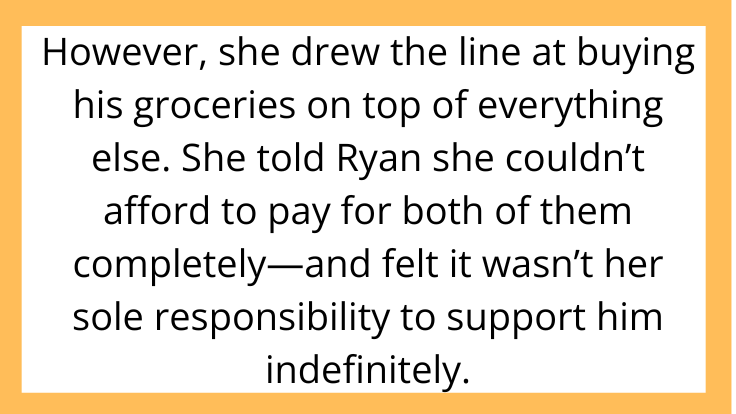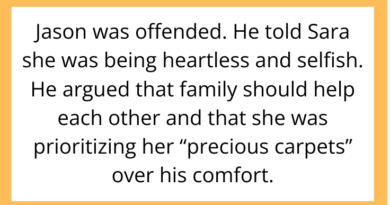AITAH for Refusing to Pay for My Boyfriend’s Groceries After He Lost His Job?
When financial hardships hit a household, everyone feels the strain. But what happens when one partner feels pressured to pick up all the slack—and isn’t sure it’s fair? In this AITAH scenario, a woman grapples with whether supporting her unemployed boyfriend means taking on full responsibility for his expenses.
Let’s dive into the story that has Reddit divided.
The Background: A Relationship Tested by Unemployment

The original poster—let’s call her Mia—is a 31-year-old graphic designer who has been dating her boyfriend, Ryan, for three years. They moved in together about eight months ago. At first, they split expenses evenly: rent, utilities, groceries, and date nights were all shared 50/50.
Two months ago, Ryan lost his job when his company downsized. He has been struggling to find work since. He receives unemployment benefits, but they barely cover his share of the rent. Mia agreed to cover rent and utilities temporarily while he looked for new opportunities.
However, she drew the line at buying his groceries on top of everything else. She told Ryan she couldn’t afford to pay for both of them completely—and felt it wasn’t her sole responsibility to support him indefinitely.
That’s when the arguments started.
The Conflict: Is Sharing a Life the Same as Sharing a Wallet?

Ryan told Mia she was being unsupportive and selfish. In his view, couples should help each other unconditionally in times of crisis. He argued that if their roles were reversed, he would take care of her without hesitation.
Mia disagreed. She explained that she was already covering rent and utilities, which was a big financial burden. She offered to help him budget his unemployment income for food or pick up a few extra items when she shopped—but she wouldn’t commit to buying all his groceries every week.
Ryan accused her of prioritizing her savings over their relationship, saying she “clearly doesn’t care about him enough to help.”
Feeling guilty but also frustrated, Mia turned to Reddit’s r/AITAH community for judgment: Was she the villain for refusing to pay for everything?
Reddit’s Take: Drawing the Line Between Support and Enabling

The comments section lit up with strong opinions. Most people sided with Mia.
Why Mia is Not the Villain
-
Shared Responsibility: While Mia is being supportive, Ryan is still an adult with some income. Even limited funds should be budgeted for basic needs.
-
Temporary vs. Permanent Support: Covering rent temporarily is generous. Expecting someone to shoulder all expenses indefinitely crosses the line into entitlement.
-
Financial Boundaries: Many commenters pointed out that relationships require empathy—but also clear limits, especially when you’re not married.
One top comment read:
“You are already doing more than many partners would. Paying rent is a huge contribution. He should be thankful, not demanding.”
The Other Side: Compassion in Hard Times

That said, some people did sympathize with Ryan’s perspective. Losing a job can be humiliating and demoralizing. It often impacts mental health and self-worth. For some, knowing your partner is willing to fully step up can be a source of comfort.
A few commenters shared stories of their own relationships where temporary full financial support kept the partnership strong. However, most agreed that Ryan’s reaction—accusing Mia of not caring—was manipulative rather than appreciative.
Bigger Questions: When Does Support Become Enabling?

This situation highlights a tension many couples face:
-
Where is the line between supporting a partner and enabling dependency?
-
How long should one person cover shared expenses?
-
What does fairness look like when circumstances are unequal?
Mia’s story is a reminder that being a good partner doesn’t mean ignoring your own financial well-being. Helping someone you love shouldn’t mean sacrificing your security.
Healthy Ways to Navigate Financial Disagreements

If you’re in a similar situation, consider these steps:
-
Have an Honest Budget Conversation
Sit down and review your combined income, expenses, and expectations. Make a clear plan for how bills will be covered—and for how long. -
Set Time Limits
Temporary help works best when there’s a clear end point or reevaluation date. -
Share Responsibilities
If one person can’t contribute financially, they can contribute in other ways: cooking, cleaning, job searching diligently, or taking on household projects. -
Avoid Guilt Trips
Using emotional pressure to get financial help often leads to resentment.
The Verdict: Sometimes Saying No is Self-Preservation

Mia’s refusal to pay for Ryan’s groceries doesn’t make her cold-hearted. It makes her realistic about her limits. Relationships thrive on generosity and support—but also on mutual respect and shared effort.
Ryan’s reaction suggests he may be struggling to cope with his situation in a healthy way. But that doesn’t mean Mia should take on every burden to ease his discomfort.


